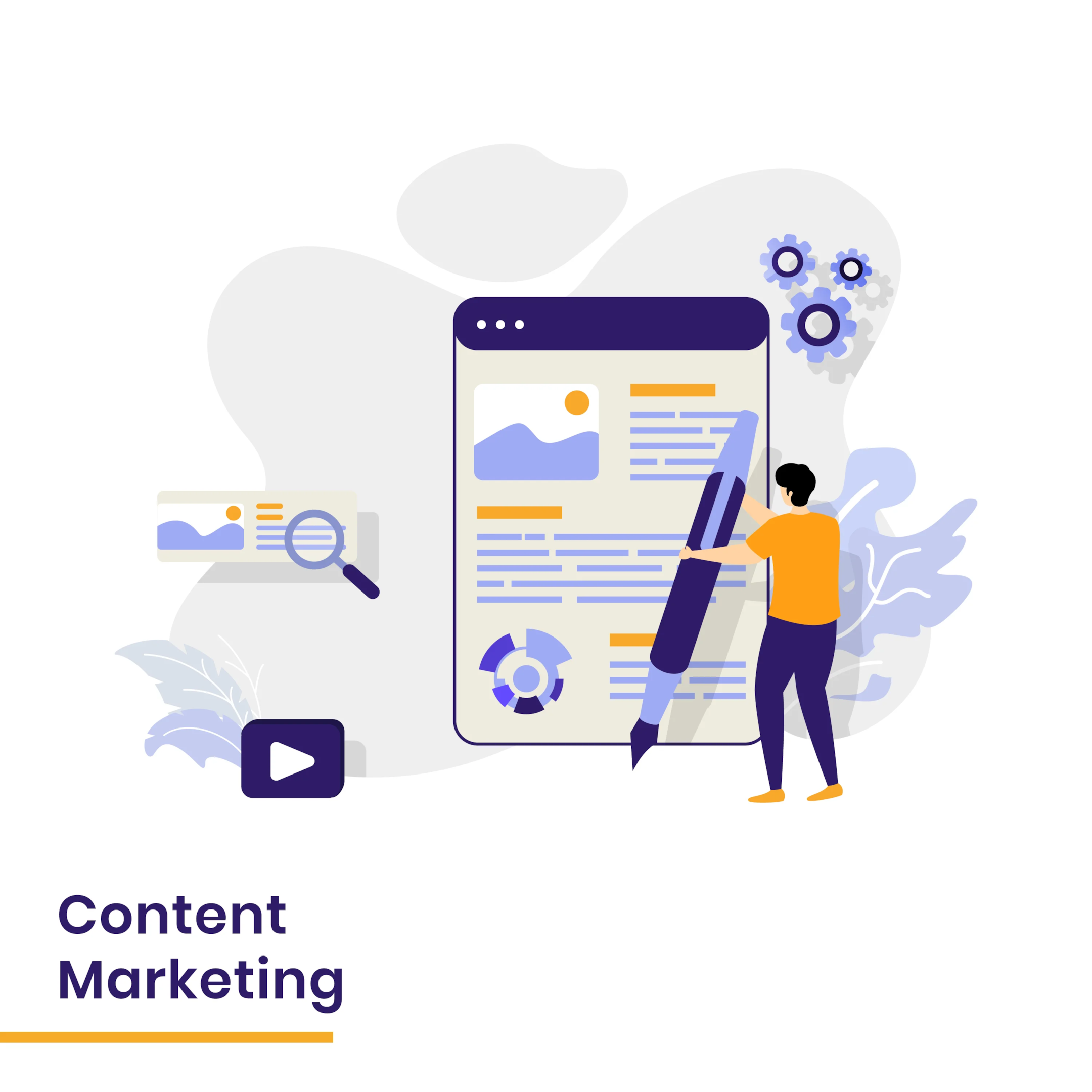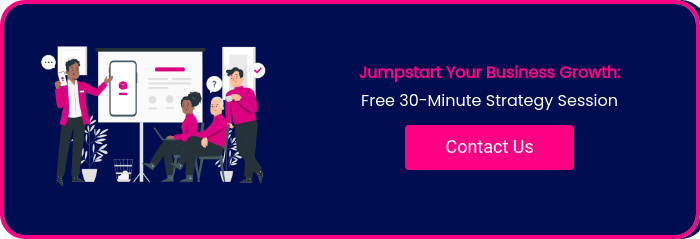Have you ever wondered how your small business can compete with industry giants and thrive in the digital landscape? The secret lies in a robust content marketing strategy! In this blog post, we'll explore the importance of content marketing for small businesses, guide you through developing and implementing your system, and share insights from successful examples. Discover the power of leveraging user-generated content, essential tools, and emerging trends to stay ahead of the competition. Are you ready to transform your business?
Short Summary
-
Content marketing is essential for small business success in 2023.
-
Develop a content strategy that resonates with the target audience and sets SMART goals & objectives.
-
Leverage tools, trends & user-generated content to create engaging content and measure results.
The Importance of Content Marketing for Small Businesses
A robust content marketing strategy can be a game-changer for small businesses. It helps build trust among your target audience, increases brand awareness, and allows you to compete with larger companies on a level playing field.
By consistently creating content that addresses your audience's pain points and offers actionable solutions, you can establish yourself as a thought leader in your niche and foster long-term relationships with your customers.
Content marketing is not only practical but also cost-efficient. Traditional advertising methods can be expensive and often offer limited reach, whereas content allows you to reach a wider audience at a fraction of the cost. With a well-planned content strategy, small business owners can leverage user-generated content, social media posts, and high-quality blog content to attract new customers and engage existing ones.
Moreover, investing in content can significantly improve your search engine optimization (SEO). Creating quality content that resonates with your clearly defined audience and distributing it across multiple channels will increase your online visibility and drive organic traffic to your website.
As a small business owner, don't miss out on the opportunity to boost your brand recognition and generate leads through an effective content marketing strategy. You can always start by planning your SMART objectives.
Developing a Content Marketing Strategy for Your Small Business
To develop a successful content strategy for your small business, you must start by setting clear goals and objectives that align with your overall business vision. Next, dive deep into understanding your target audience's demographics, preferences, and pain points to create content that truly resonates with them.
Lastly, explore various content types - blog posts and videos to infographics and podcasts - and produce content to maximize engagement and reach. Remember that your content marketing strategy should be focused on creating actionable content that drives results and improves your SEO.
By carefully planning your content calendar, crafting diverse and informative content, and leveraging free tools and resources, you can ensure that your small business stays ahead of the competition in the ever-evolving digital marketing landscape.
Setting Goals and Objectives
Establishing measurable goals and KPIs is crucial for tracking the success of your small business content marketing efforts and ensuring they align with your overall business objectives. Everyday purposes for small businesses include increasing website traffic, generating leads, and boosting sales. Adhering to the SMART (Specific, Measurable, Achievable, Relevant, and Time-bound) approach ensures your goals are realistic and attainable.

If you're pressed for time or lack the resources to create content in-house, consider outsourcing content creation to cost-effective freelancers on platforms like UpWork or Fiverr. Aligning content creation with the various stages of the buyer's funnel can also lead to more effective marketing campaigns and higher conversion rates, ensuring that your customers are targeted with relevant content at the right time.
Identifying Your Target Audience
To create content that resonates with your audience and provides real value, it's essential to understand their demographics, preferences, and pain points. You can gather this information using Semrush's Topic Research tool, monitoring online conversations about your target audience and competitors, and designing concise surveys or questionnaires. Typeform is a fantastic tool for creating visually appealing surveys with various templates.
Once you've collected valuable insights about your target audience, use this data to create content tailored to their needs, interests, and pain points. Combining customer feedback from emails, messages, and web form submissions can help you repurpose this information into shareable content that is engaging and valuable for your audience.
Understanding your target market can create a customer-centric approach that drives results and fosters lasting relationships.
Choosing the Right Content Types
Selecting the most effective content types for your audience is crucial for maximizing engagement and reach. Blog posts, videos, infographics, and podcasts are popular choices that cater to different preferences and learning styles. For instance, video content can be incredibly engaging and powerful, allowing you to reach more viewers and interested customers. Experiment with various content types and monitor their performance to determine which resonates most with your audience.
When creating video content, ensure it is helpful, valuable, and ideally no longer than 60 seconds for maximum engagement. Infographics, on the other hand, are 30 times more likely to be read than text-only articles, making them an excellent tool for capturing your audience's attention.
Thoughtful content, such as reviews, opinion pieces, market research, or commentaries on industry developments, can also help establish your small business as a thought leader and drive organic traffic to your website.
Implementing Your Content Marketing Strategy and Creating Content

Now that you have a solid understanding of the critical components of a successful content marketing strategy, it's time to bring your plan to life! Start by creating high-quality, original, and informative content that addresses your audience's pain points and offers actionable solutions. To do this effectively, consider exploring various content ideas that can enhance your marketing strategy.
Next, promote your content across social media platforms, email newsletters, and other relevant channels to reach your target audience and boost visibility. Finally, track and analyze your content marketing KPIs to refine and optimize your online marketing strategy, ensuring continuous improvement and success.
Creating Engaging Content
Focus on crafting high-quality, original, informative content that tackles your audience's challenges and provides actionable solutions. This can be achieved by mapping out the structure of your content, ensuring that each piece is comprehensive and addresses all potential questions your reader might have. By focusing on quality over quantity, you can create content that meets your customers' needs and adds value to their experience.
Remember to create diverse content that caters to different preferences and learning styles. Whether it's an in-depth blog post, a captivating video, an eye-catching infographic, or a thought-provoking opinion piece, variety in content writing is critical to keeping your audience engaged and coming back for more.
Stay true to your brand values and ensure your content reflects your company's mission and goals.
Promoting Your Content Effectively

Promoting your content effectively is essential for reaching your target audience and increasing visibility. Utilize social media platforms, email newsletters, and other relevant channels to amplify your content and engage with potential customers. For instance, email marketing is a powerful tool for promoting content, enabling you to reach an already interested audience. Paid advertising and forming connections on your social media channels can also help boost your content's reach and drive engagement.
Consider collaborating with influencers, industry experts, marketing agencies, and other businesses to expand your reach further. This increases your credibility and exposes your content to a broader audience, ultimately driving more traffic and potential customers to your website. By strategically promoting your content, you can maximize your marketing efforts and achieve better results.
Measuring Content Marketing Success
Measuring the success of your small business content marketing efforts is crucial for continuous improvement and long-term success. You can uncover what is performing well and what needs improvement by tracking and analyzing content marketing KPIs, such as website traffic, social media engagement, and conversion rates. Utilizing tools like Google Analytics enables you to refine and optimize your strategy for even better results, ensuring that your efforts are fruitful and aligned with your overall business goals.
Make data-driven decisions and adjust your content strategy based on insights gained from your KPIs. Continuously test new content ideas and promotion tactics to keep your strategy fresh and engaging. You can ensure ongoing progress and success by staying committed to measuring and optimizing your content efforts.
Leveraging User-Generated Content for Small Business

User-generated content, such as reviews, testimonials, and social media posts, can be valuable in your content marketing strategy. By showcasing real-life experiences of customers using your products or services, you can build trust and credibility with potential customers. Plus, user-generated content can significantly boost your marketing efforts and strengthen customer relationships without spending a fortune on advertising.
One successful example of leveraging user-generated content is Joy, a free wedding planning app and website. Joy capitalized on user-generated content by using their customers' love stories as the driving force behind their brand. This helped them gain a loyal following and demonstrated the power of user-generated content in creating meaningful connections with customers.
Don't be afraid to tap into the creative potential of your audience and let their stories shine!
Examples of Successful Small Business Content Marketing
Learning from successful small business content marketing examples can provide valuable insights and inspiration for your business content marketing strategy. Take Kitchen Projects by Nicola Lamb, for instance. This small business has mastered the art of content through engaging blog posts, informative videos, and mouth-watering recipes that keep its audience coming back for more. Hundred of people visit their website organically every month.
Another inspiring example is Funko, an online retailer specializing in geek culture and merchandise. Their witty and engaging blog posts, social media presence, and user-generated content have created a loyal following. By showcasing its unique products in a fun and approachable manner, Funko has managed to stand out in a competitive market and cultivate a dedicated customer base.
These successful examples demonstrate the power of creativity and effective tactics in content marketing for small businesses. By learning from and adapting their strategies to your business, you can create a unique and engaging content marketing plan that drives results and sets you apart from the competition. Implementing existing content marketing ideas for small businesses is crucial for success in today's competitive landscape.
Essential Content Marketing Tools for Small Businesses

Utilizing essential content marketing tools can significantly streamline your content creation, promotion, and analysis processes, maximizing efficiency and results. Canva is a user-friendly graphic design tool that allows you to create stunning visuals for your content, while Piktochart enables you to easily design eye-catching infographics. For a more comprehensive content marketing solution, consider using Semrush's Content Marketing Platform, which offers influential keyword research, content planning, and performance tracking features.
ContentShake is another valuable content tool that can help small businesses grow organically by leveraging its powerful combination of business expertise, AI, and competitive data to create content 10x faster. Investing in the right tools can save time and resources while ensuring that your content marketing efforts are effective and impactful.
Don't let a lack of resources or expertise hinder you from achieving content marketing success. With the help of these essential tools, you can create high-quality content, promote it effectively, and analyze its performance to refine and optimize your strategy. Stay ahead of the competition and drive meaningful results for your small business with the power of content marketing tools.
Staying Ahead: Content Marketing Trends for Small Businesses in 2023

To stay ahead of the competition and ensure your content marketing strategy remains relevant and engaging, it's keeping an eye on emerging trends for small businesses in 2023 is crucial. Some key trends to watch include focusing on quality over quantity, personalization, and using AI and automation to create more data-led content. Embracing interactive content and short-form videos and emphasizing brand values will also be essential for small businesses looking to impact the ever-changing digital landscape.
By staying up-to-date with the latest content marketing trends and incorporating them into your strategy, you can ensure that your small business remains competitive and continues to grow. This may involve experimenting with new content formats, adopting innovative technologies, or refining your targeting and personalization efforts to serve your audience's needs better.
As a small business owner, staying ahead of the curve is essential for long-term success. By embracing emerging content marketing trends and continually refining your strategy, you can stay relevant in the ever-changing digital landscape and drive meaningful results for your business.
Summary
In conclusion, content marketing is a powerful tool for small businesses to build trust, increase brand awareness, and compete with larger companies. By developing a solid content marketing strategy, creating engaging content, promoting it effectively, and leveraging user-generated content, you can drive profitable customer action and ensure long-term success. Stay ahead of the competition by focusing on emerging trends and embracing essential content marketing tools to maximize efficiency and results. Now is the time to transform your business with the power of content marketing!
Frequently Asked Questions
Is content marketing effective for small businesses?
Content marketing can be incredibly effective for small businesses as it helps boost website visits, generate leads, and build trust with potential and current customers.
Content marketing can help drive your small business to success when used correctly.
Why do small businesses need content marketing?
Small businesses need content marketing to boost their visibility and reputation, differentiate themselves from the competition, engage their audience, and generate more leads and revenue.
Content marketing helps create an emotional connection with potential customers and gives them reasons to choose your business over others.
What are the four types of marketing content?
Content marketing covers four main areas—attracting, building authority, creating affinity, and taking action. Each has a unique role in creating a successful marketing campaign.
Get ready to start crafting your content for maximum impact!
What is content for a business?
Content for a business is any digital content, such as websites, blogs, emails, social media accounts, posts, and videos created to inform, engage, and inspire current and potential customers. It is essential to growing your customer base and maintaining their loyalty.
What are some key benefits of content marketing for small businesses?
By leveraging content marketing, small businesses can reach more customers, establish a unique brand identity, and ultimately generate greater returns on their investment.
June 21, 2023
